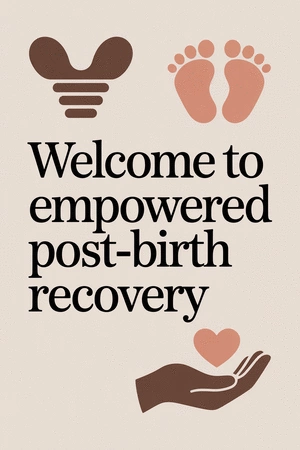Did you know that approximately 80% of new mothers experience some form of emotional distress during the postpartum period? Understanding and navigating this crucial recovery phase can make a world of difference in your journey as a new mom.
What You Will Learn
- Postpartum recovery is a unique journey for every woman, emphasizing the importance of patience and self-compassion.
- Common symptoms such as vaginal soreness and uterine cramping are normal; awareness helps in managing them effectively.
- Proper laceration care and hygiene are vital for comfort and healing during recovery.
- The 5-5-5 Rule encourages optimal rest and gentle movement, promoting a balanced recovery.
- Nourishing your body with a balanced diet and hydration is essential for physical and emotional healing.
- Engaging in gentle exercises, like Kegel exercises and walking, helps in regaining strength and improving mood.
- Support from partners and family can significantly enhance recovery, creating a nurturing environment for mothers.
- Connecting with postpartum support groups can provide emotional relief and valuable resources, fostering community support.
- Recovery takes time, and celebrating small victories can boost morale and reinforce self-worth during this journey.
Postpartum Recovery Tips and Strategies
This visual outlines key recovery strategies for new mothers after vaginal birth, focusing on self-care tips and symptom management. For a comprehensive guide on your postpartum journey, explore our healing after childbirth guide.
Common Symptoms
- Vaginal Soreness: Lasts for a few weeks.
- Uterine Cramping: Similar to menstrual cramps.
- Healing from Tears: Essential for recovery.
Self-Care Strategies
- 5-5-5 Rule: 5 minutes of rest, movement, and personal time.
- Nutrition: High-fiber and protein-rich foods.
- Stay Hydrated: Aim for at least 8 glasses of water.
Perineal Care Tips
- Use Witch Hazel: To soothe irritation.
- Gentle Cleansing: Pat dry instead of wiping.
- Wear Loose Clothing: To avoid irritation.
Exercise Recommendations
- Kegel Exercises: Strengthen pelvic floor.
- Walking: Beneficial for mood and recovery.
- Stretching: Alleviate tension and improve flexibility.
Understanding Vaginal Birth Recovery for New Moms
Defining Postpartum Recovery After Vaginal Birth
After giving birth, many new moms experience what we call the postpartum recovery phase. This period is all about healing, both physically and emotionally. You might find that your body feels different, and it’s completely normal. It’s also important to note that recovery isn’t a race; it’s a journey that varies from woman to woman.
During this time, it's common to have a mix of emotions. Some days you’ll feel on top of the world, while others might leave you feeling overwhelmed. Your body has done something incredible, and it's adjusting to its new normal. Remember, you’re not alone in this experience—many women share these feelings, and talking about it can help!
Common Symptoms During Postpartum Recovery
As you navigate through postpartum recovery, you may encounter several common symptoms. These can include vaginal soreness, uterine cramping, and even the healing process from any tears or episiotomies. Understanding these symptoms can empower you to manage them better.
- Vaginal Soreness: This can feel uncomfortable and might last for a few weeks.
- Uterine Cramping: Similar to menstrual cramps, they can occur as your uterus returns to its normal size.
- Healing from Tears: If you had any vaginal tears or an episiotomy, proper care is essential for healing.
It’s crucial to listen to your body during this time. If something doesn’t feel right or if you have questions, don’t hesitate to reach out to a healthcare professional. They are there to guide you through this healing process, and for more specific guidance on returning to exercise, check our postpartum exercise return guidelines!
Vaginal Healing and Laceration Care
Healing from vaginal tears or lacerations is a key part of postpartum recovery. Caring for these areas correctly can make a significant difference in your comfort level. So, let’s talk about the best practices for ensuring a smooth healing journey!
- Keep the Area Clean: Gently wash the area with warm water at least twice a day.
- Use Ice Packs: Applying ice packs can help reduce swelling and discomfort.
- Wear Loose Clothing: Opt for breathable fabrics to avoid irritation.
Taking these steps can aid in your recovery and make you feel more comfortable as you heal. Remember, Empowered Post-Birth Recovery is here to support you in understanding and navigating this journey!
Essential Self-Care Strategies for New Mothers
Prioritizing Rest with the 5-5-5 Rule
One of the best things you can do for yourself during postpartum recovery is to prioritize rest. The 5-5-5 Rule is a fantastic tool to help you gradually regain your strength. This means aiming for 5 minutes of rest, 5 minutes of gentle movement, and then 5 minutes of personal time throughout your day.
This simple strategy encourages you to listen to your body and adjust as needed. It’s not about pushing yourself too hard; instead, it’s about recognizing when you need a moment to recharge. Remember, every bit of rest counts towards your healing journey!
Practical Perineal Care Tips
Managing perineal discomfort is crucial for your overall well-being. Here are some practical tips to help you feel more comfortable:
- Use Witch Hazel: This natural remedy can soothe irritation and reduce swelling.
- Stay Hydrated: Drinking plenty of water helps with healing and can ease any discomfort.
- Gentle Cleansing: Always pat dry after using the bathroom instead of wiping.
By focusing on these self-care strategies, you can significantly improve your comfort level during postpartum recovery. And remember, it’s okay to ask for help; you deserve it!
Sitz Baths for Relief and Recovery
Sitz baths can be a game changer for postpartum healing! They provide soothing relief and help promote recovery. Here’s how to make the most of this simple yet effective technique:
- Use Warm Water: Fill a shallow basin with warm water to ease discomfort.
- Frequency: Consider taking sitz baths 2-3 times a day, especially after using the bathroom.
- Duration: Soak for about 15-20 minutes to maximize the benefits.
Incorporating sitz baths into your daily routine can help you feel more at ease as you recover. It’s a wonderful way to give yourself some much-needed TLC, and you deserve it!
Nutrition and Hydration for Recovery
Nourishing your body is vital during postpartum recovery. A balanced diet and staying hydrated can significantly aid in your healing process. Here’s what to focus on:
- High-Fiber Foods: Incorporate fruits, vegetables, and whole grains to combat postpartum constipation.
- Protein-Rich Foods: These help in tissue repair, so think lean meats, beans, and nuts.
- Stay Hydrated: Aim for at least 8 glasses of water a day to support your body.
Eating well can boost your energy levels and support your body as it heals. Your body has been through a lot, and giving it the nutrients it needs is an essential part of recovery!
Gentle Exercises for Recovery
As you start to feel a bit better, gentle exercises can be hugely beneficial. They help promote healing and strengthen your body. Here are some exercises to consider:
- Kegel Exercises: These help strengthen your pelvic floor muscles.
- Walking: A brisk walk can do wonders for your mood and physical recovery.
- Stretching: Gentle stretching can alleviate tension and improve flexibility.
Always listen to your body and start slowly. The goal is to feel stronger and more comfortable in your skin—remember, it’s not a race, and for more insights into managing recovery, our article on vaginal birth recovery for moms offers additional tips!
Pro Tip
Did you know? Incorporating mindfulness practices, such as deep breathing or meditation, can significantly enhance your postpartum recovery experience. Taking just a few minutes each day to focus on your breath can help reduce stress and promote emotional well-being during this transformative phase.
Empowering New Mothers Through Knowledge and Support
Encouraging Partner Involvement During Recovery
Having a partner by your side during recovery can make a world of difference. They can help you in so many ways, from assisting with household chores to giving you emotional support. Communication is key—talk openly about your needs and expectations!
Here are some ways partners can be involved:
- Emotional Support: Listen to your feelings and provide comfort when needed.
- Household Chores: Share the load by taking on cooking, cleaning, and caring for older siblings.
- Intimacy Management: Discuss changes in intimacy and find ways to connect physically and emotionally.
Remember, a supportive partner can help create a nurturing environment that encourages healing. At Empowered Post-Birth Recovery, we believe that when partners are active participants, it strengthens the entire family's well-being!
Family Support and Community Resources
Support from family can be invaluable during your recovery. It’s essential to lean on your loved ones and utilize community resources tailored for new mothers. Surrounding yourself with understanding people can truly make this journey smoother.
Consider these resources:
- Postpartum Support Groups: Joining a group can provide shared experiences and emotional relief.
- Lactation Consultants: Getting help with breastfeeding can ease one of the many challenges new moms face.
- Home Visitors: Some communities offer programs where trained professionals visit to provide guidance and support.
Don’t hesitate to reach out to family members and friends; their support can lift your spirits and provide the encouragement you need as you heal. Connecting with community resources can broaden your support network, making recovery feel a bit less daunting!
Reassuring the Path to Recovery
As you progress on your postpartum journey, remember that recovery takes time. There will be ups and downs, but it's important to practice patience and self-compassion throughout this phase. Celebrate your small victories, whether it’s getting out of bed without discomfort or enjoying a moment of quiet with your baby!
Here are some key recovery tips to keep in mind:
- Listen to Your Body: Acknowledge when you need rest and don’t be afraid to ask for help.
- Stay Informed: Knowledge is power! Understanding the recovery process can ease anxiety.
- Practice Self-Compassion: Be gentle with yourself; you’re doing an incredible job!
At Empowered Post-Birth Recovery, we’re here to remind you that your journey is unique and valid. So, take a deep breath, and embrace this new chapter with kindness towards yourself!
Engaging Resources and Community Support
Connecting with Postpartum Support Groups
Postpartum support groups can be a lifeline for new mothers. By sharing experiences with others who are on a similar journey, you can find both comfort and advice. Many groups meet online or in-person, making it easy to find one that fits your schedule!
Benefits of joining support groups include:
- Shared Experiences: Hearing others' stories helps you know you're not alone.
- Emotional Support: Building relationships with others can create a sense of belonging.
- Expert Guidance: Many groups are led by professionals who can provide valuable resources.
Don’t underestimate the power of community; it can foster healing and even friendships that last a lifetime!
Final Thoughts on Vaginal Birth Recovery
As you navigate your postpartum journey, remember to prioritize your recovery. It’s perfectly okay to reach out for help when you need it—embracing support is a sign of strength. Each step you take towards healing is a testament to your resilience and dedication as a mother!
Whether you are connecting with partners, family, or community resources, keep in mind that you’re not alone. Surround yourself with love, understanding, and knowledge as you adjust to this beautiful yet challenging new phase of life. You've got this! For additional support on your emotional well-being, consider exploring resources on nurturing mental health for mothers.
Recap of Key Points
Here is a quick recap of the important points discussed in the article:
- Postpartum Recovery Journey: Recovery after vaginal birth varies for each woman; it’s essential to be patient and listen to your body.
- Common Symptoms: Be aware of symptoms like vaginal soreness, uterine cramping, and healing from tears; seek medical advice if necessary.
- Perineal Care: Maintain cleanliness, apply ice packs, and wear loose clothing to aid recovery from lacerations.
- Prioritize Rest: Use the 5-5-5 rule to balance rest, gentle movement, and personal time effectively.
- Nutrition and Hydration: Focus on a balanced diet with high-fiber and protein-rich foods while staying hydrated to support healing.
- Gentle Exercises: Engage in gentle activities like Kegel exercises, walking, and stretching as you regain strength.
- Support System: Involve your partner and family to create a nurturing environment, and utilize community resources for additional support.
- Self-Compassion: Practice patience and be gentle with yourself throughout your recovery journey.
Frequently Asked Questions About Postpartum Recovery
Q: What are the most common symptoms experienced during postpartum recovery after vaginal birth?
A: Common symptoms include vaginal soreness, uterine cramping as the uterus contracts, and the healing process from any tears or episiotomies. These symptoms are normal and typically subside within a few weeks.
Q: What is the 5-5-5 Rule for postpartum recovery?
A: The 5-5-5 Rule is a self-care strategy that encourages new mothers to aim for 5 minutes of rest, 5 minutes of gentle movement, and 5 minutes of personal time throughout their day. It helps in gradually regaining strength and prioritizing self-care.
Q: How can I effectively manage perineal discomfort during postpartum recovery?
A: Effective perineal care tips include using witch hazel to soothe irritation, staying hydrated, and gentle cleansing by patting dry instead of wiping after using the bathroom. Sitz baths can also provide significant relief.
Q: What kind of exercises are recommended for postpartum recovery?
A: Gentle exercises like Kegel exercises to strengthen pelvic floor muscles, walking for mood and physical recovery, and stretching to alleviate tension and improve flexibility are recommended. Always listen to your body and start slowly.
Q: Why is partner and family involvement important for a new mother's recovery?
A: Partner and family involvement provide crucial emotional support, help with household chores, and allow for open communication about needs and expectations. A strong support system creates a nurturing environment that significantly enhances the healing process.
For more specific insights into postpartum abdominal recovery, consider reading about postpartum abdominal repair exercises.







